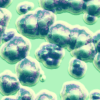Over the years, researchers have significantly improved their understanding of type 1 diabetes, but there are still many questions left unanswered. They still do not understand exactly why some people develop this condition and others do not, and there is still no cure.
A recent study is taking a closer look at the role gut bacteria plays as a risk or protective factor in the development of type 1 diabetes. Scientists at Harvard Medical School studied mice who were bred to develop diabetes and altered their genetics and levels of gut bacteria. Each mouse carried a gene variant that was shown in other studies to protect against diabetes. During the first six weeks of their lives, the mice were given antibiotics, and the scientists believe that this disrupted the natural balance of gut bacteria reducing their protection against diabetes. The mice showed inflammation of the pancreas, which often precedes type 1 diabetes.
However, they also found that those mice who inherited the protective gene from the mother were still resistant to diabetes, but those that received it from the father were not. This could be an important link between the protective abilities of gut microbiota and genetics passed between mother and baby. But it is important to note that there are “significant physiological differences” between mice and humans according to Diane Mathis, lead author of the study and professor in the Department of Microbiology and Immunology at Harvard Medical School.
Though more extensive research needs to be conducted, especially to determine how the results may correlate to humans, scientists believe that reducing exposure to antibiotics in newborns and pregnant women may be beneficial in reducing risk of type 1 diabetes or maintaining gene protection.
These types of studies are essential in advancing research to prevent and cure type 1 diabetes. The Diabetes Research Connection strives to provide early career scientists with the funding necessary to pursue innovative research for type 1 diabetes. One hundred percent of research funds raised go directly to the scientists. To learn more about current projects or make a donation, visit http://localhost/drc.




